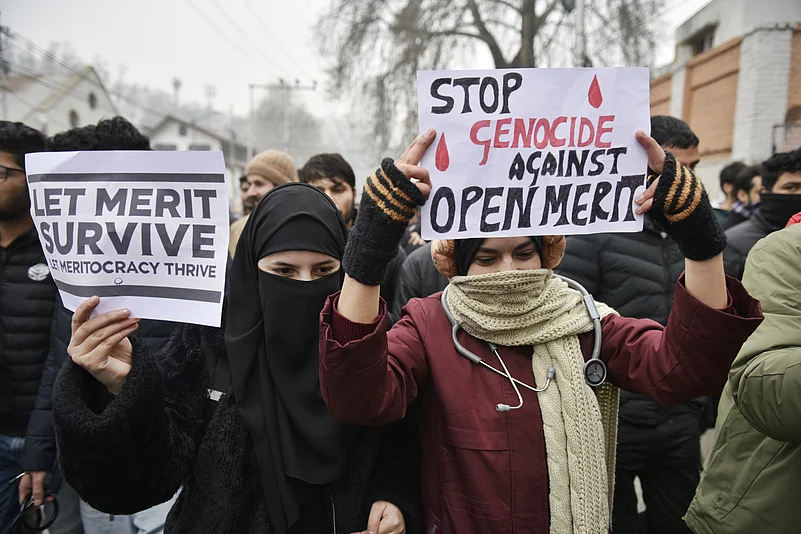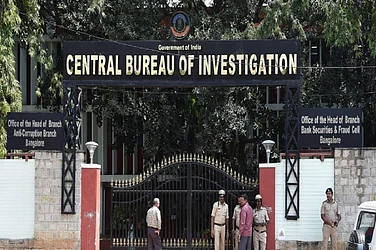Reservation, or positive discrimination, was introduced to correct historical injustices and give the marginalised a fair chance in a system that had long excluded them. But in Jammu and Kashmir, it is now pushing the unreserved—mostly the Kashmiri-speaking population—out of government jobs and educational institutions. Nearly 70 per cent of the population is left to compete for less than 40 per cent of the opportunities, as quotas keep increasing. Nevertheless, the reservation policy has loopholes at every turn.
A Majority Without Seats
After the abrogation of Article 370 in 2019, the governor-led administration amended the reservation policy, and in the last five years, the reserved category in J&K has become 60 per cent. This includes:
20 per cent for Scheduled Tribes (STs) ,
8 per cent for SCs,
10 per cent for Residents of Backward Areas (RBA),
8 per cent for Other Backward Classes (OBCs),
4 per cent for residents of the Actual Line of Control/International Border
There is also a 10 per cent reservation for Economically Weaker Sections (EWS), meant for individuals from the general category who are economically disadvantaged and do not belong to any other reserved category. Beyond these vertical reservations, open merit seats shrink further due to horizontal reservations:
4 per cent for Persons with Disabilities (PWD)
3 per cent for children of defence personnel
1 per cent for children of paramilitary and police personnel
2 per cent for candidates with exceptional proficiency in sports.
The seats that do not fall under any reservation category are also open to candidates from reserved categories. This, despite the fact that 69 per cent of the erstwhile state’s population belongs to the general category, the highest in India, according to the 2011 census. At the same time, National Crime Records Bureau (NCRB) data from 2019 shows J&K has the lowest crimes against Scheduled Castes. For many, this isn’t just about affirmative action—it’s a calculated move, a tool of political manoeuvring.
If we compare J&K with Bihar, where the general category constitutes only 15.56 per cent of the population, yet 50 per cent of seats remain open for general merit. In June 2024, the Patna High Court struck down the Bihar government’s move to raise reservations from 50 per cent to 65 per cent. Although the state assembly had passed the bill, the court blocked it.
Jammu vs Kashmir Within Reservation
Within reservation categories, there’s a regional disparity too. J&K official data on reserved categories, shared with the Assembly on March 15 showed that the current policy benefits candidates from Jammu more than those from Kashmir.
The data on the population who benefitted under different reserved categories since April 2023 shows that all 67,112 beneficiaries under the Scheduled Caste (SC) category are from Jammu, with none from Kashmir. Similarly, 4,59,493 people (85.3 per cent) from Jammu benefitted under the Scheduled Tribe (ST) category, while only 79,813 (14.7 per cent) did in Kashmir. The disparity is also evident in the Economically Weaker Section (EWS) category, where only 2,273 people (7.7 per cent) from Kashmir benefitted, compared to 27,420 (92.3 per cent) from Jammu. This is despite Kashmir making up around 55 per cent of J&K’s total population, compared to Jammu’s 45 per cent, according to the 2011 census.
The government released the data in response to a query from People's Conference chairman and Handwara MLA Sajad Gani Lone. In the Assembly, Lone said, “Each passing day, Kashmiri-speaking candidates figure less in the results of competitive examinations. This is not because they are incompetent but because the space was being squeezed. They are being crowded out from the competitive space by virtue of the system of reservation, which is totally rigged against them by the current 60 per cent reservation policy.”
A veteran analyst told 해외카지노, “It is strange that in Kashmir, reservation has been based on language, where all non-Kashmiri-speaking populations have been brought under the ambit of reservation, though overwhelming reservation classes share the same roads, transport, schools, health care, etc., as the Kashmiri-speaking population.”
“This anti-majority, anti-democratic system of reservation must be reviewed for its long-term negative results for national interest,” he added.
Another political analyst, Ahmad Ayaz, based in Srinagar, adds: “Many in Kashmir already feel that post-August 2019, policies have been designed to dilute their political and social influence. This reservation policy only reinforces that perception.”
Demand For Rationalisation
In March 2024, the latest addition to Jammu and Kashmir’s reservation list saw the Pahari community, a linguistic group, being granted Scheduled Tribe (ST) status. Prior to this, the Gujjar-Bakerwal tribal community held the largest share of the 10 per cent ST quota in government jobs and education. But the inclusion of Paharis, a more educated and affluent group, led to resentment among Gujjar-Bakarwals. In response, the Union Territory administration devised a solution: it increased the existing ST quota by 10 per cent to be shared by the Paharis and three newly included groups while keeping the Gujjar-Bakarwals' reservation share untouched.
Sinan Gull, a research fellow at the University of Kashmir, says, “Reservation was supposed to be temporary to uplift discriminated people. But it’s only increasing with no signs of decrease. If it is a rule, why not extend the same to the Kashmiri-speaking population also? After all, they’ve endured over three decades of conflict, militarisation, and shutdowns.”
Another problem with the reservation system, according to his research findings, Gull says, “is that most of the Scheduled Tribe 1 community are unaware of the reservation system. The benefits go to a few, which has led to an elite within the reserved community.”
Amid all this, Jammu & Kashmir stands at the top of the unemployment charts. In urban areas, 32 per cent of job seekers aged 15-29 are without work, as per the latest Periodic Labour Force Survey (PLFS).
Umar Keel, a student and member of the Open Merit Students’ Association J&K, says, “In Kashmir, where the private sector is little more than a mirage, people cling to government jobs as a lifeline. Yet, the reservation system, in its boundless generosity, has ensured that the general category is left scavenging for the few remaining crumbs. Merit, once the cornerstone of progress, now stands as an orphan in the evolving landscape of reservation in J&K.”

In December, general-category students protested outside the chief minister Omar Abdullah’s residence on Gupkar Road, demanding a fairer reservation policy. Among them was student activist Mir Mujeeb, who joined ruling National Conference (NC)’s own MP Aga Syed Ruhullah Mehdi, who led the protest. “We are not against reservations,” Mujeeb says. “We simply want the government to rationalise the reservation policy. The allocation of reservations should reflect the actual demographic distribution.”
“Consider this: If there are ten available jobs in the market, the general category is only eligible for three but effectively gets two. How is that fair?” he questions. Mujeeb also criticised politicians for repeatedly offering reservations to various groups as a means of securing their vote, saying, “But at what cost? The cost is borne by the general population.”
Following the protests and a meeting between the student body and Chief Minister, a Cabinet subcommittee was formed to look into the grievances regarding the current reservation policy and is expected to submit its report within six months. Before the elections, which were held after a 10-year gap and for the first time since the abrogation of Article 370, JKNC had mentioned in its manifesto that the reservation policy would be reviewed and any injustice or imbalance would be corrected.
On March 15, after controversy over the absence of a specific timeline in the initial government order, Chief Minister Abdullah clarified that the Cabinet subcommittee reviewing the reservation policy has been given six months to complete its report. Three of the six months have already passed. If the government fails to resolve the issue, Mujeeb says, “We will continue to press for a solution through all means under the ambit of the constitution."
















